
From FAMU Public Relations

Florida A&M University (FAMU) alumna and U.S. Department of Agriculture (USDA) Deputy Assistant Secretary for Civil Rights Monica Rainge this week outlined the America Rescue Plan (ARP) that will bring debt relief to Black and other socially disadvantaged farmers.
At the event held at the FAMU Research & Extension Center in Quincy Wednesday, Congressman Al Lawson, state, county and local elected officials and College of Agriculture and Food Sciences faculty and staff joined dozens of Black farmers eager to learn about the Biden administration’s plan to erase billions in debt for struggling farmers of color.

Across America, there are 16,000 eligible borrowers who owe $3.9 billion, Rainge said. This week, eligible borrowers should begin receiving letters from their local Farm Service Agency (FSA) officials saying how much they owe. Once farmers agree with the information, they should sign the form and return it.
“We have every intent to get this money out to you as soon as possible,” Rainge said. “The first checks will be cut in June. We are committed to paying out all checks in an expeditious manner.”
The USDA plans to pay up to 120 percent of the outstanding loans, which will include the full cost of the loan and an extra 20 percent to assist farmers in paying the tax liability and any fees associated with the payoff of their loan.
“In previous Class Action settlements, you received some type of settlement, but there was still a tax liability that farmers could not pay and they ended up losing their farms as a result of the failure to pay those taxes,” Rainge told the gathering. “We thank God that Senator (Raphael) Warnock and others envisioned this debt plan, they thought about how they could also include financial assistance on the back end of this. So, there’s the debt relief, which means essentially the USDA is going to pay off 100 percent of your loans and you will also receive a direct payment of 20 percent of your loan amount to pay off expenses related to the debt clearance now.”
Socially disadvantaged farmers include African American, American Indian, Alaskan Native, Hispanic Asian American or Pacific Islander producers. In order to be eligible, farmers must have an outstanding qualified loan as of January 1, 2021. Borrowers in default or in collection are eligible to have their debt covered. Direct FSA and FSA guaranteed loans are eligible for repayment. However, rural development and marketing assistance loans, and loans from commercial lenders that are not FSA guaranteed lenders are ineligible.
Rainge also warns socially disadvantaged producers that the USDA is not charging any fees so they should be aware of companies offering to help them for a fee.
“They are not with the USDA,” Rainge said. “There is no fee for you to sign up to be a part of this program. The only step you need to take is to contact your FSA office; our FSA staff is there to assist you.”
The USDA is also partnering with community-based organizations and universities such as FAMU to ensure that they have the outreach and technical assistance to provide borrowers assistance with financial, legal and tax planning services.
“At FAMU, our foundational mission is attached to the plight of the Black farmer and we are pleased to be part of the project to help rescue them. America’s wealth, especially here in the South, is rooted in Black farm labor,” said President Larry Robinson, Ph.D.
“FAMU, one of 19, 1890 Land Grant universities, also stands ready to assist farmers in their quest, not just for survival, but for economic viability and to ensure that future generations of African Americans will see farming as an honorable and profitable way to make a living,” Robinson continued.
In America, the number of Black farmers has consistently declined from nearly 1 million in 1920 to fewer than 50,000 today. A century ago, 13,000 Black farmers operated across Florida compared to just 2,000 today. That is an 85 percent decrease in Black participation in the industry of food, science, national security, said Florida Agriculture Commissioner Nikki Fried.
“Facts show, it has been harder for farmers of color to acquire land, to get access to funding and loans, to get farms off the ground and was made harder by federal agencies,” Fried said. “The American Rescue Plan is about helping. Paying off the loans of socially disadvantaged farmers helps everyone and hurts no one. It is morally right,” Fried continued. “To those who say this hurts banks, I say, people need to come before profits.”
For more information, call FAMU Co-op Extension at 850-599-3546 or email extension@famu.edu.


Be the first to comment